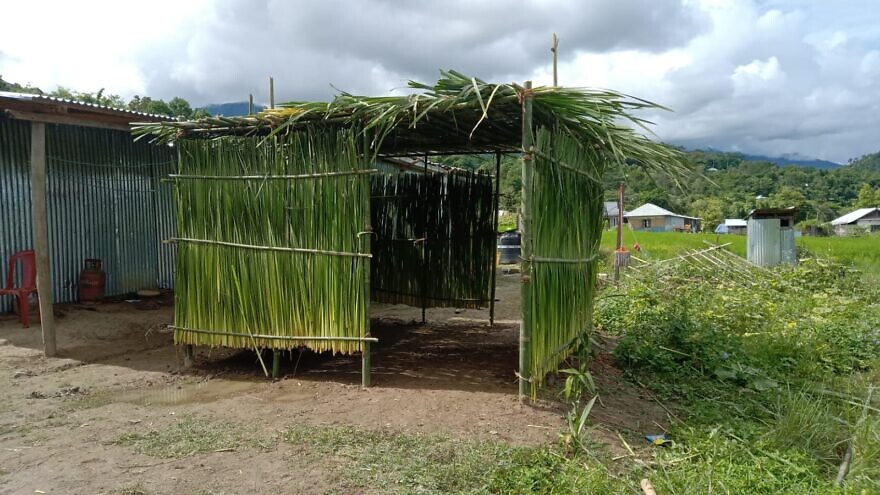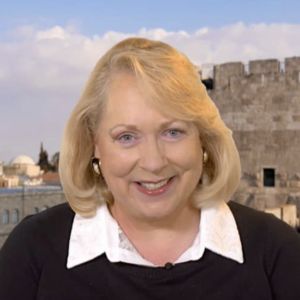More than 40 years ago, when downtown Johannesburg was a vibrant civic center filled with shops, offices, hotels and a bustling inner-city life, many Jews lived and worked there. I remember setting up Chabad’s Central City Sukkah in the central business district, one of the most prominent spots in the city. We received permission to place the sukkah at the foot of the Carlton Center, then Africa’s tallest building and a massive complex with a shopping mall, office towers and a five-star hotel.
Many hundreds or perhaps thousands of Jews used the sukkah over Chol Hamoed, the Intermediate Days of Sukkot. The more observant would come and eat lunch. Shoppers and passersby would be invited in to recite the blessing over the lulav and etrog, have a bite and say the brachah over the sukkah. I remember being quite taken aback when an Israeli visitor confessed to me that it was his first time ever inside a sukkah.
We invited a professional photographer to take a picture of the sukkah in the shadow of the skyscraper. He had to use a very wide-angle lens. While the sukkah was indeed dwarfed by the skyscraper, it still made an important and eloquent statement.
There are two opinions in the Talmud as to what we commemorate when we build our sukkah. One is that it recalls the booths our ancestors built to shelter themselves from the burning desert sun after the Exodus from Egypt. The other is that the sukkah recalls not a physical shelter, but the spiritual shelter provided by the Clouds of Glory, God’s protective cover, which shielded our ancestors from the harsh elements and other threats.
Rashi, in his commentary on the Bible, seems to favor the concept of spiritual shelter rather than physical shelter.
This appears to be corroborated by the halachah on the laws of sukkah, which holds that if the schach—the leafy covering—is so thick that the rain cannot penetrate, then the sukkah is invalid (posul).
It would seem, therefore, that the purpose of the sukkah is to remind us where our true security lies. It is under the protection of God as symbolized by the Clouds of Glory, rather than our own man-made shelters.
This is the most important moral lesson we are meant to derive from the sukkah. “Life is but a sukkah,” a temporary dwelling—here today, gone tomorrow—“a fleeting dream,” as we said on Rosh Hashanah and Yom Kippur.
Where do we look for strength, hope, salvation and our ultimate security? Not the mighty man-made skyscrapers. On the dreaded day of 9/11, we watched the vivid and horrible sight of the mightiest towers on earth collapsing like a deck of cards. What took the most advanced society on our planet years to build took a few madmen less than two hours to destroy.
Suddenly, life was nothing less than meshuggah. Suddenly, an ordinary trip on an airplane required taking off our shoes and being scanned for weapons. Even a small pair of scissors or a vial of liquid was suspect. Suddenly, nowhere was safe.
Yes, at the end of the day, “life is but a sukkah.” When we realize our own vulnerability and our dependence on God for our life, livelihood, safety and security, we begin to understand that we are under His protective shield. Then we begin to appreciate that, wherever we are, we can feel safe in His embrace.
As we read in Psalm 91, “He who dwells in the shelter of the One Above abides under the protection of the Almighty. I say of the Lord, He is my refuge and my fortress, my God in whom I trust.”
In the end, skyscrapers have fallen, but the resilience of the little sukkah is nothing short of eternal.
Every year in my sukkah at home we sing a classic Yiddish song called “Ah Sukkele ah Kleineh”—“The Little Sukkah.” It is the story of a dilapidated, barely standing sukkah that is threatened by gale-force winds. The wife and daughter of the house are petrified that any moment their sukkah will, God forbid, collapse. But the husband and father comfort them, reminding them that their little sukkah has stood for over 2,000 years. The sukkah thus becomes the symbol of the Jewish condition—frail and vulnerable but indestructible. Somehow, by the grace of God, we survive, come what may.
No winds can destroy the Jewish sukkah. Our traveling tabernacle has given us shelter from the winds of change that swept through many continents over the centuries of Jewish wandering. When we remember that it is God, the Guardian of Israel, who is our ultimate shelter and source of security, we find strength and serenity no matter what is howling outside.
May we all enter the sukkah literally and figuratively, and find the shelter and security we seek in the warm embrace of the small but impregnable shelter.
Chag Sameach! See you in the sukkah.




